Are you considering bringing home a Maine Coon tabby kitten? These magnificent felines combine the striking tabby pattern with the majestic Maine Coon breed, creating a pet that’s both visually stunning and full of personality. Whether you’re a first-time cat owner or an experienced feline enthusiast, this comprehensive guide will walk you through everything you need to know about raising, caring for, and understanding these gentle giants.
Read Also: Maine Coon Cat: The Ultimate Guide to This Majestic Breed 🐾
Introduction to Maine Coon Tabby Kittens
The Maine Coon is one of America’s oldest natural breeds, often referred to as the “gentle giants” of the cat world. When these majestic cats sport the classic tabby pattern, the result is a stunning combination that many cat lovers find irresistible. Maine Coon tabby kittens capture hearts with their tufted ears, bushy tails, and expressive eyes, all wrapped in the distinctive tabby markings that make them truly stand out.
These remarkable kittens grow into large, sociable cats known for their dog-like personalities and impressive size. A perfect blend of beauty and temperament, Maine Coon tabbies offer the distinctive physical traits of the Maine Coon breed along with the classic patterning that has made tabby cats beloved worldwide.
Table of Contents
Physical Characteristics of Maine Coon Tabby Kittens
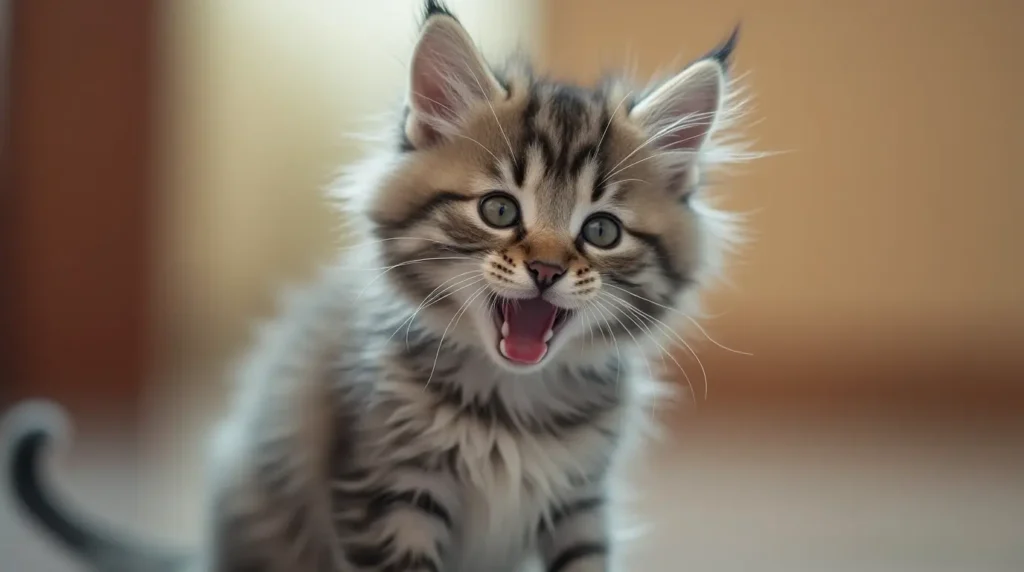
Before diving into care specifics, let’s explore what makes these kittens so special physically:
- Size: Even as kittens, Maine Coons are typically larger than other breeds, with males eventually reaching 13-18 pounds and females 8-12 pounds
- Coat: Medium to long-haired with a thick, water-resistant undercoat
- Tabby Patterns: May display classic tabby, mackerel tabby, or ticked tabby patterns
- Distinctive Features: Tufted ears, large paws, bushy tails, and expressive eyes
- Growth Rate: Slow maturation, taking 3-5 years to reach full size
- Colors: Tabby patterns can appear in various color combinations including brown, silver, red, and cream
Maine Coon tabby kittens are known for their slow development, remaining playful and kitten-like longer than many other breeds. This extended growth period allows owners to enjoy the kitten phase a bit longer than with standard domestic cats.
🏆 Maine Coon Tabby Kitten Price
When considering adding a Maine Coon tabby kitten to your family, understanding the pricing landscape is essential. These sought-after kittens typically command higher prices than many other breeds due to their popularity and distinctive characteristics.
The cost of a Maine Coon tabby kitten can vary significantly based on several factors:
- Pedigree Quality: Show-quality kittens with championship bloodlines typically cost $1,000-$2,500
- Pet-Quality: Kittens without breeding rights usually range from $800-$1,500
- Coloration: Rare tabby color combinations may command premium prices
- Breeder Reputation: Established breeders with health guarantees typically charge more
- Geographic Location: Prices vary by region, with urban areas often having higher prices
- Documentation: Registered kittens with papers cost more than unregistered ones
When budgeting for your Maine Coon tabby kitten, remember to factor in additional startup costs including:
- Initial veterinary checkups
- Vaccinations
- Spaying or neutering
- Microchipping
- Essential supplies (litter box, beds, toys, scratching posts, etc.)
While the initial investment may seem substantial, many owners find that the joy and companionship these exceptional cats provide is well worth the price. Always purchase from reputable breeders who prioritize health and temperament over profit, and be wary of unusually low prices that may indicate irresponsible breeding practices.
🧬 Maine Coon Tabby Mix
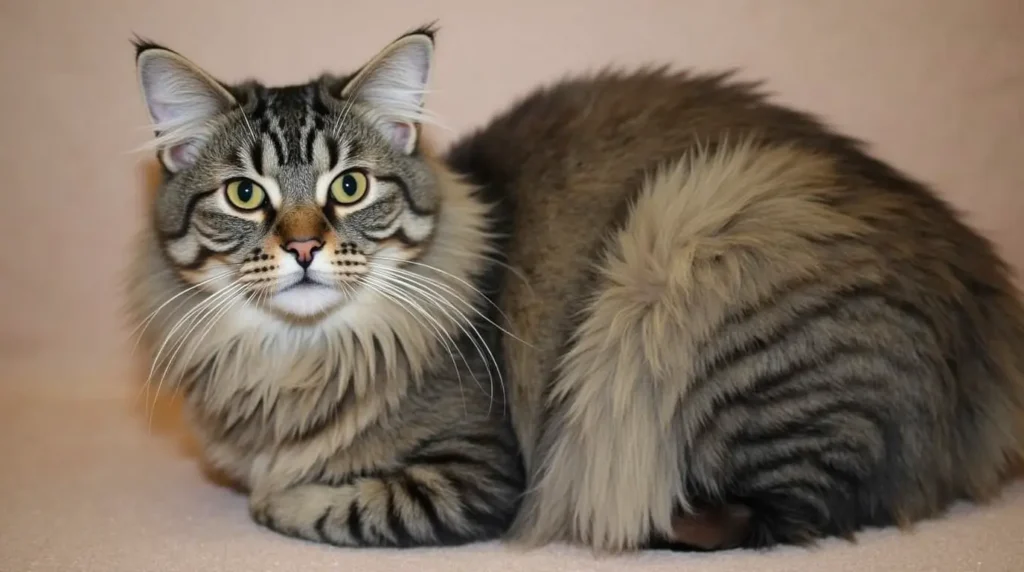
The Maine Coon tabby mix represents a fascinating blend of Maine Coon genetics with other breeds, all while displaying the beloved tabby pattern. These mixed-breed cats often inherit many desirable Maine Coon traits while sometimes featuring characteristics from their other parentage.
Maine Coon mixes typically exhibit:
- Medium to large size (though usually smaller than purebred Maine Coons)
- Partial Maine Coon features like tufted ears or bushy tails
- The distinctive tabby pattern over various base coat colors
- Friendly, sociable personalities similar to purebred Maine Coons
- Variable coat lengths, depending on the other breed in the mix
Many Maine Coon tabby mixes come from unintentional breeding between Maine Coons and domestic cats, creating unique individuals with their own special blend of characteristics. These mixes are often more affordable than purebred kittens and can be found through rescue organizations and shelters.
The combination of Maine Coon traits with other breed characteristics creates wonderfully unique companions. Many owners report that these mixes retain the friendly, people-oriented nature of Maine Coons while sometimes having lower maintenance requirements or different physical traits based on their mixed heritage.
🔍 Maine Coon Tabby Kitten For Sale
Looking for a Maine Coon tabby kitten for sale? Finding the perfect kitten requires research, patience, and knowing where to look. Here’s a comprehensive guide to navigating the purchasing process:
Reputable Sources
- Specialized Breeders:
- Research CFA or TICA registered breeders
- Request references and health testing information
- Visit the cattery in person when possible
- Maine Coon Rescue Organizations:
- Breed-specific rescues sometimes have kittens available
- Adoption fees are typically lower than breeder prices
- Cats often come vaccinated and altered
- Cat Shows:
- Meet breeders in person and see their cats
- Compare multiple breeders in one location
- Learn more about the breed standard
Red Flags When Searching
Be wary of:
- Extremely low prices compared to market averages
- Sellers unwilling to show the kitten’s living conditions
- No health guarantees or vaccination records
- Pressure to buy immediately without proper screening
- Kittens available for pickup before 12 weeks of age
Questions to Ask Sellers
- What health testing has been done on the parents?
- What vaccinations has the kitten received?
- What diet is the kitten currently eating?
- What socialization has the kitten experienced?
- Is there a health guarantee or contract?
The search for your perfect Maine Coon tabby kitten may take time, but patience ensures you bring home a healthy, well-socialized companion from ethical sources. Remember that responsible breeders often have waiting lists, which is actually a positive sign of their commitment to careful breeding practices.
😺 Tabby Maine Coon
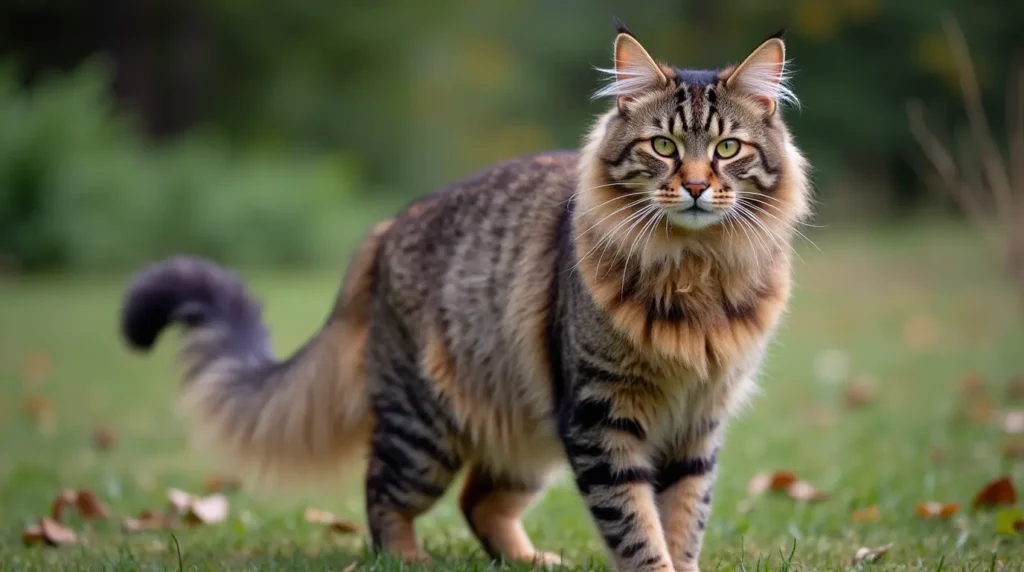
The tabby Maine Coon combines the most recognizable coat pattern in cats with America’s native longhaired breed. The result is a visually striking cat with personality to match its impressive appearance.
Understanding Tabby Patterns
The tabby pattern in Maine Coons can appear in several variations:
- Classic (Blotched) Tabby: Features swirling patterns and the distinctive “bullseye” on the side
- Mackerel Tabby: Displays narrow striping that runs perpendicular to the spine
- Ticked Tabby: Each hair has bands of color, creating a speckled appearance
- Patched Tabby: Combines tabby patterns with patches of solid color
All tabby patterns feature the characteristic “M” marking on the forehead, which some folklore suggests stands for “Mau,” the Egyptian word for cat, or “Mohammed,” who supposedly had great affection for tabbies.
Color Variations
Tabby Maine Coons come in numerous color combinations including:
- Brown tabby (the most common)
- Silver tabby
- Red (orange) tabby
- Cream tabby
- Blue tabby
Each color variation maintains the distinctive tabby pattern while offering a different overall appearance. The varied palette means there’s likely a tabby Maine Coon color to match any aesthetic preference.
The tabby pattern enhances the Maine Coon’s already impressive appearance, highlighting their muscular build and magnificent coat. Many enthusiasts believe the pattern helps emphasize the wild, natural look that makes Maine Coons so appealing.
🔥 Maine Coon Tabby Mix Orange
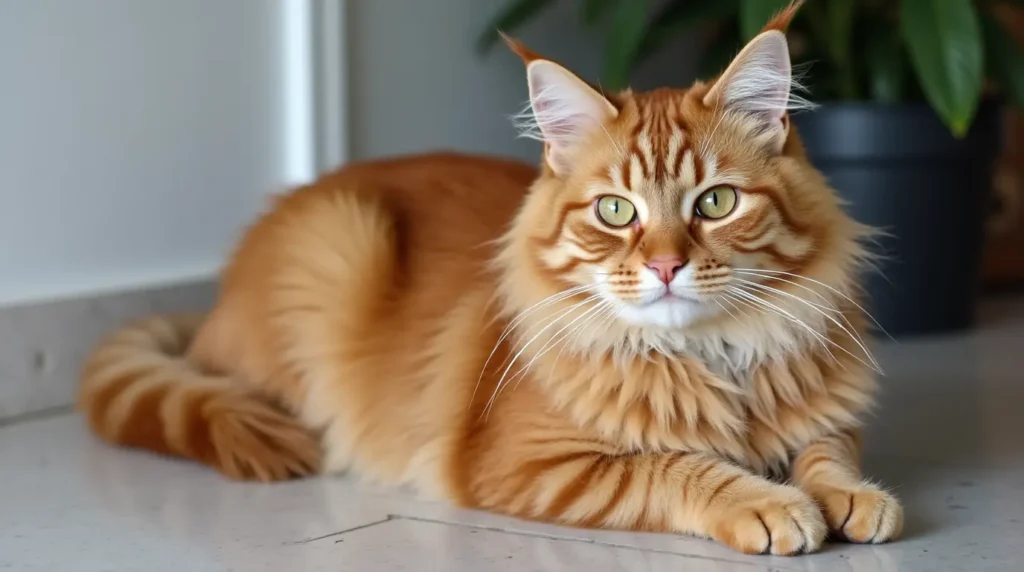
The Maine Coon tabby mix orange variety is among the most sought-after color variations in the Maine Coon world. These stunning cats display vibrant orange (often called “red” in cat fancy terminology) tabby markings that create a warm, fiery appearance that many find irresistible.
Read Also: Orange Maine Coon Kittens – Discover the Charm of These Playful Felines
Characteristics of Orange Tabby Maine Coons
- Coloration: Ranges from deep rust to light cream with distinct tabby markings
- Gender Distribution: Approximately 80% of orange tabbies are male due to color genetics
- Personality: Often associated with friendly, outgoing temperaments (though this is more anecdotal than scientific)
- Appearance: The orange coloration accentuates the distinctive M forehead marking and makes eye color appear more vibrant by contrast
Orange tabby Maine Coons and their mixes tend to have particularly striking appearances, with the warm tones complementing their expressive eyes. Whether displaying the classic swirling pattern or sharp mackerel stripes, the orange coloration makes these cats particularly photogenic.
Many owners report that their orange Maine Coon mixes have particularly affectionate personalities, though temperament is influenced by many factors beyond coat color. The combination of the Maine Coon’s naturally friendly disposition with the orange tabby coloration results in a cat that’s both visually stunning and likely to be a wonderful companion.
When looking for an orange Maine Coon tabby mix, expect higher demand for these colorful felines, especially males, due to their popularity and relative scarcity compared to other color variations.
🪒 Maine Coon Tabby Mix Short Hair
The Maine Coon tabby mix short hair variant offers the best of both worlds – the impressive size and wonderful temperament of the Maine Coon with a lower-maintenance short coat featuring beautiful tabby markings. These cats typically result from Maine Coon crossbreeding with domestic shorthair cats.
Advantages of Short-Haired Maine Coon Mixes
- Reduced Grooming Requirements:
- Less fur to manage throughout the home
- Fewer hairballs and matting issues
- Easier maintenance for busy households
- Heat Tolerance:
- Better suited for warmer climates than their longhaired counterparts
- Less seasonal shedding variation
- Distinctive Maine Coon Features:
- Often retain the muscular build and large size
- May keep characteristic tufted ears and expressive eyes
- Usually exhibit the friendly Maine Coon personality
Short-haired Maine Coon tabby mixes typically shed less than purebred Maine Coons while still displaying many of the breed’s beloved characteristics. They often maintain the substantial bone structure and distinctive head shape, just with a shorter coat that shows off their tabby patterns with particular clarity.
These cats make excellent companions for those who love the Maine Coon temperament and size but prefer a cat with lower grooming needs. While they won’t have the full magnificent coat of a purebred, many owners find the reduced maintenance a worthwhile tradeoff.
Caring for Your Maine Coon Tabby Kitten
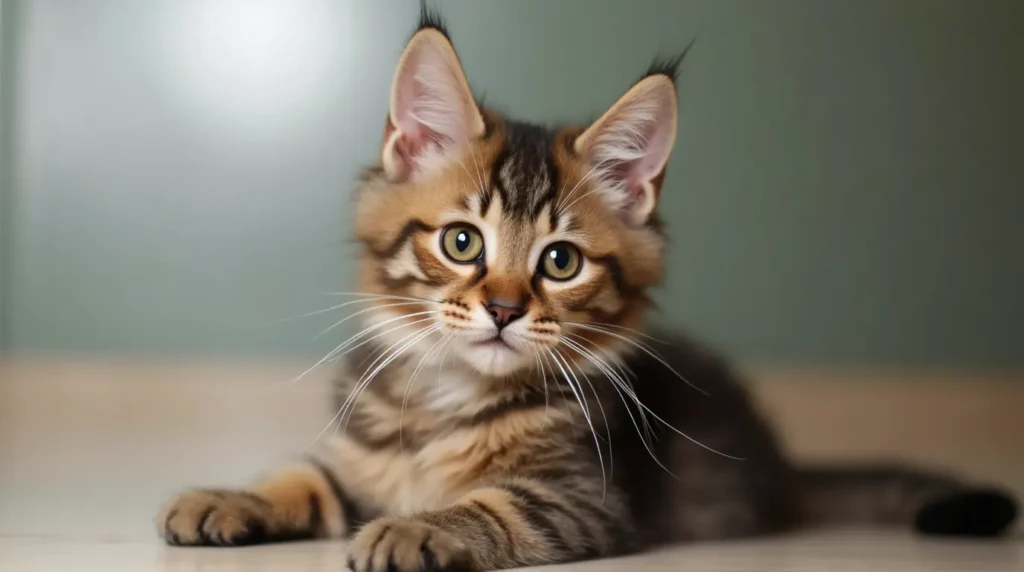
Bringing home your Maine Coon tabby kitten marks the beginning of a wonderful journey. These special cats require specific care to ensure they grow into healthy, well-adjusted adults:
Nutritional Needs
Maine Coon kittens need a high-quality diet formulated for growth:
- Premium kitten food with high protein content
- Feeding schedules based on age (4-6 meals daily for young kittens)
- Fresh water always available
- Gradual transition to adult food around 12 months
Grooming Requirements
Despite their long coats, Maine Coon tabbies are relatively easy to maintain:
- Brush 2-3 times weekly (more during seasonal shedding)
- Occasional baths (their water-resistant coat stays cleaner than many breeds)
- Regular nail trimming and ear cleaning
- Dental care including brushing and dental treats
Exercise and Play
These active, intelligent cats need stimulation:
- Interactive toys that engage their hunting instincts
- Climbing trees or shelves to utilize vertical space
- Puzzle feeders to engage their minds
- Daily play sessions to burn energy
Health Considerations
Maine Coon tabbies may be predisposed to certain conditions:
- Hypertrophic cardiomyopathy (heart disease)
- Hip dysplasia
- Spinal muscular atrophy
- Polycystic kidney disease
Regular veterinary checkups are essential, along with keeping vaccinations current and maintaining parasite prevention appropriate for your region.
Personality and Behavior
The personality of Maine Coon tabby kittens is one of their most endearing qualities:
- Social Nature: Exceptionally people-oriented and family-friendly
- Vocalization: Known for their distinctive chirps and trills rather than typical meows
- Intelligence: Highly trainable and quick to learn household routines
- Water Fascination: Many enjoy playing with water, a trait uncommon in most cats
- Dog-Like Traits: Often follow owners from room to room and come when called
- Gentle Disposition: Despite their size, they’re typically careful with children and smaller pets
Maine Coon tabbies typically maintain kitten-like playfulness well into adulthood. They’re known for being less aloof than many cat breeds, often seeking out human company and participating actively in family life.
FAQ About Maine Coon Tabby Kittens
Can a Maine Coon cat be a tabby?
Yes, Maine Coon cats can absolutely be tabbies. In fact, the tabby pattern is one of the most common and natural coat patterns found in Maine Coons. These cats can display classic tabby, mackerel tabby, or ticked tabby patterns in various color combinations including brown, silver, red, cream, and blue. The tabby pattern is part of the breed’s natural heritage, reflecting their origins as working farm cats in the northeastern United States. Many Maine Coon enthusiasts particularly prize the tabby pattern as it enhances the breed’s wild, natural appearance.
How can I tell if my tabby cat is a Maine Coon?
Identifying Maine Coon characteristics in a tabby cat involves looking for several distinctive features:
- Large Size: Maine Coons are significantly larger than average domestic cats
- Rectangular Body Shape: Long, muscular body with substantial bone structure
- Head Shape: Slightly longer than wide with high cheekbones and square muzzle
- Ears: Large ears with lynx tips (tufts at the tips) and often heavy furnishing inside
- Eyes: Large, slightly oblique set, and expressive
- Paws: Large, tufted paws that historically acted as “snowshoes”
- Tail: Long, bushy tail that can wrap around their body for warmth
- Coat: Shaggy, uneven coat that’s longer on the ruff, stomach, and britches
- Personality: Friendly, dog-like disposition with distinctive chirping vocalizations
Not all these traits need to be present, especially in mixed-breed cats. DNA testing can provide definitive answers if you’re unsure about your cat’s heritage.
How long do Maine Coon tabby cats live?
Maine Coon tabby cats typically enjoy a lifespan of 12-15 years, though many well-cared-for individuals live into their late teens or even early twenties. Their longevity depends on several factors:
- Genetics: Purebred Maine Coons from health-tested lines often avoid hereditary issues
- Healthcare: Regular veterinary care and preventative medicine significantly impact lifespan
- Diet: High-quality nutrition appropriate for their life stage
- Lifestyle: Indoor cats typically live longer than those allowed to roam outside
- Weight Management: Maintaining healthy weight prevents many age-related conditions
The tabby pattern itself has no impact on longevity; it’s simply a coat color variation. To maximize your Maine Coon tabby’s lifespan, focus on preventative healthcare, appropriate nutrition, regular exercise, and keeping them as indoor cats or providing supervised outdoor access only.
How do you tell if my kitten is a Maine Coon mix?
Identifying Maine Coon mix kittens involves observing several characteristics that may indicate Maine Coon heritage:
- Growth Rate: Maine Coon mixes often grow larger and develop more slowly than typical domestic kittens
- Ear Development: Watch for ear tufts and large ears that seem proportionally large for the head
- Paw Size: Disproportionately large paws that suggest they’ll grow into a larger cat
- Coat Texture: Even in short-haired mixes, the coat may be thicker with longer fur around the neck
- Tail Length: A longer-than-average tail that’s bushy or becoming bushier as they grow
- Vocalization: Distinctive chirping or trilling sounds rather than standard meows
- Social Behavior: Unusually friendly, dog-like personality compared to typical kittens
- Water Interest: Unusual fascination with or lack of fear around water
Remember that in mixes, not all Maine Coon traits will be present, and characteristics become more apparent as the kitten matures. Without papers or known parentage, visual identification remains somewhat subjective. DNA testing services specifically for cats can provide more definitive information about your kitten’s genetic background.
Conclusion
Bringing a Maine Coon tabby kitten into your home means welcoming a magnificent companion with striking looks and a heart-stealing personality. These gentle giants offer the perfect combination of beauty, intelligence, and affection, making them ideal companions for many households.
Whether you choose a purebred Maine Coon with tabby markings or a Maine Coon tabby mix, you’ll be rewarded with a distinctive cat that stands out from the crowd. Their playful nature, social disposition, and impressive appearance make them truly special additions to any family.
With proper care, nutrition, and regular veterinary attention, your Maine Coon tabby will thrive for many years, offering companionship, entertainment, and the unique joy that comes from sharing your life with one of these remarkable felines. The journey with a Maine Coon tabby is one filled with chirps, trills, playful antics, and unwavering friendship – truly one of the most rewarding experiences a cat lover can have.
